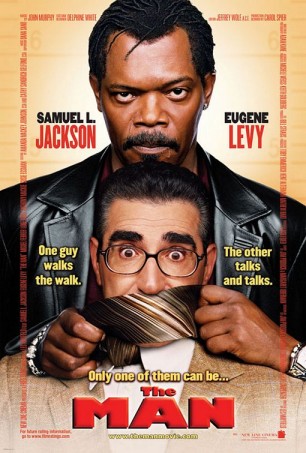|
The
Man
For all intents and purposes, The Man should have
been yet another in a long line of unoriginal buddy films
that follow a typical tried and recycled formula in which
one semi-baked character schools another half-baked one-note
character in the ways of the world.
You
all know the drill well enough. Lethal Weapon meets
48 Hours meets Rush Hour by way of Beverly
Hills Cop. Let’s not even mention the allusions
to Downtown this film seemingly harbors, based
on the trailer alone. Yeah, you read that correctly, Downtown.
That’s
the way the system works. Ever wonder why nothing ever seems
new in today’s studio system? It’s because nothing
is. Everything has been done at one point or another. The
formulas have been tested and they either work or they don’t,
and the action buddy comedy is one of those genres that
seemingly wins audiences over time and again.
The
problem with The Man is not that it’s an
old dog being trotted out for us to gawk at. The problem
is that it’s an old dog that’s learned some
new tricks, and damn if it doesn’t work in spite of
itself.
Much
of the credit goes to the casting of Eugene Levy and Samuel
L. Jackson because, both being geniuses in their own right,
putting them together is a comedic time bomb waiting to
go off. Levy plays the straight man, Andy Fidler, a suburbanite
clod who is content in his daily routine of family and dental
supply sales. His career has led him to comfortable success,
which has in turn steered him in the direction of big, bad
Detroit, MI en route for a dental supply sales rep convention.
Before
we get into the inevitable counter role portrayed by Jackson,
let’s take a moment to focus in on Fidler, which is
what the film chooses to do to great reward. Levy plays
Fidler as a clod, but never stoops to the level of rendering
him incompetent. Sure, he’s a boob, but he’s
a maroon in the sense of a fish out of water. Surprisingly
Levy refrains from the excessive use of pratfalls, awkward
bumblings, and outrageous exaggerations he is most known
for in films such as American Pie.
Instead,
Levy shows us that Fidler is confident and capable, even
if he is naïve to the ways of the street. The film
does well to let audiences know that Fidler is not a one
note joke; sure he’s funny, but we laugh in spite
of him, not because he is outlandishly absurd.
Enter
Jackson’s Derrick Vann, a walking amalgamation of
several roles from Jackson’s career. Vann mostly resembles
a cross between Jackie Brown’s Ordell Robbie,
Pulp Fiction’s Jules Winfield, Shaft, and
at one point Unbreakable’s Elijah Price,
thanks to a cane.
He’s
a hard-talking ATF agent whose mouth spews witticisms as
quickly as he spouts vulgarities in a beautiful mix of the
profane and the profound. Vann, we learn, is stirring up
a pot of trouble while investigated the simultaneous death
of his crooked partner and the theft of a cache of weapons
from a Federal building.
Naturally,
Vann’s association with the corrupt dead man has placed
him under the suspicious eye of an unnamed Internal Affairs
agent played by Miguel Ferrer. The trailer for the film
does an excellent job setting up the humdrum circumstances
which lead to intersection of Fidler and Vann’s individual
walks of life, but it is what the film chooses to do with
this setup that makes the whole thing click so neatly.
Case
in point, we know Fidler will somehow become crucial to
Vann’s investigation, but what we don’t know
going in is that something bigger is being examined on screen
than merely a buddy gun heist bust arc. Fidler, we learn,
is an eternal optimist. He innately trusts humanity nearly
to a fault, and proudly exclaims that he’s “never
met someone he didn’t make friends with eventually.”
Vann,
on the other hand, is an eternal pessimist, cynically insisting
that people are only out for themselves and that trusting
others only leads to “getting dead.” Sure, this
seems like a given considering the genre in question, but
what makes it more fun is that director Les Mayfield treats
a conversation over a hamburger with more importance than
he does a car chase or a joke at the expense of a feeble
character.
Sure,
the things said during the conversation are hilarious thanks
to the expert delivery and timing of Levy and Jackson, but
it is refreshing to see touches of character study at work
here.
Whenever
a family oriented event rears its head in a film such as
this, it usually means that somewhere down the line there
will be a race to attend, or the reluctant family member,
who is often at risk of absence due to dedication to their
job, will happen upon attending within the course of doing
their job.
In this
case, we have a dance recital, and the reluctant yet dedicated
family member is Vann. Instead of fabricating a scenario
that allows Vann to attend thanks to a nearby meeting place
to exchange guns and payment, or stopping the criminal in
enough time to catch the final act of his daughter’s
performance, the film manages to find a way that allows
the plot to progress, Fidler to gain some recognition, and
Vann to attend without feeling forced or unnatural.
The
third act manages to remain interesting, even if it eventually
boils down to an aggressive firefight and massive gunplay.
Yes, this is prerequisite, but the real showdown takes place
prior, when Fidler and Vann are pitted against one another
and each one’s initial ideologies are put to test.
Sometimes,
in life, it’s possible to have the best of both worlds.
Rating:

|








